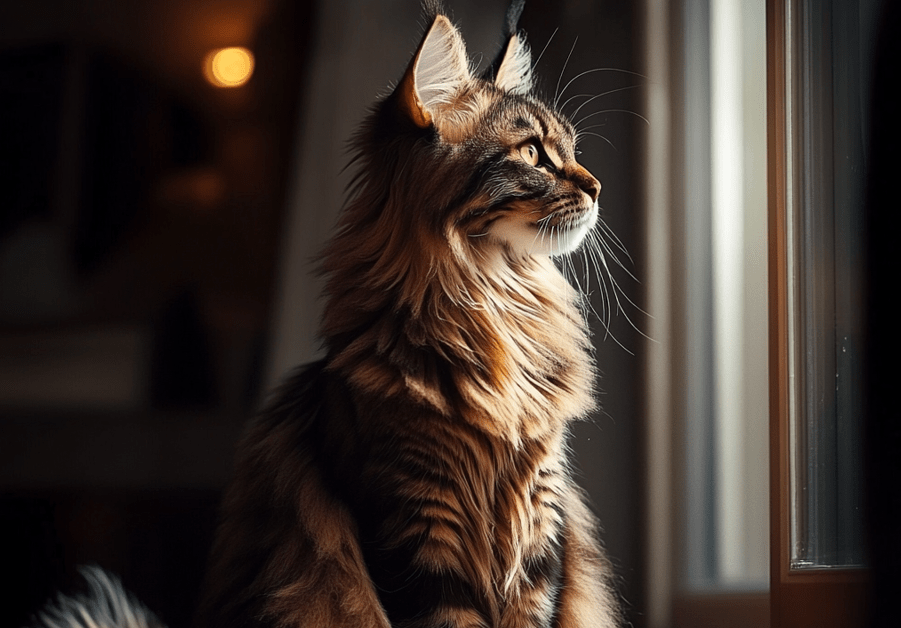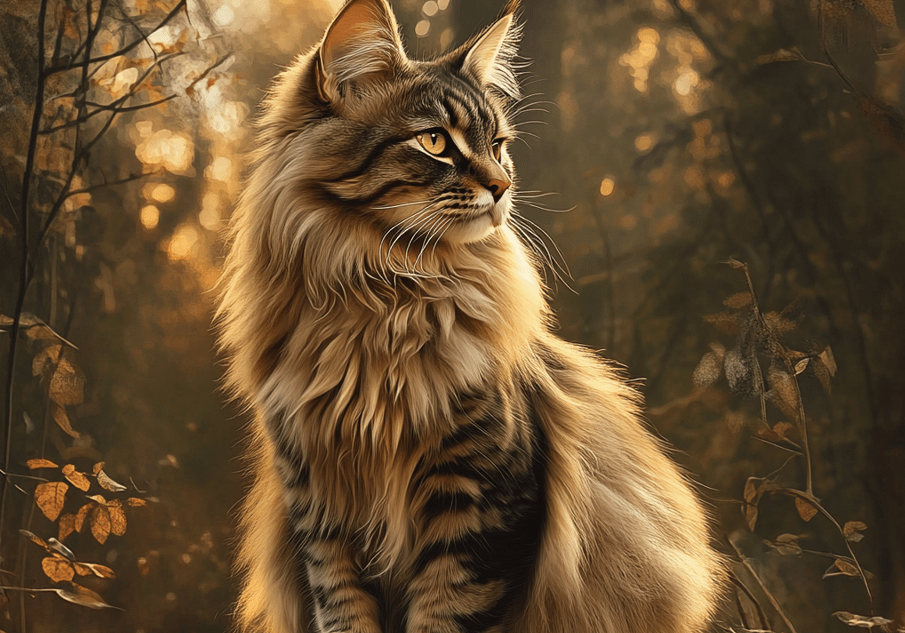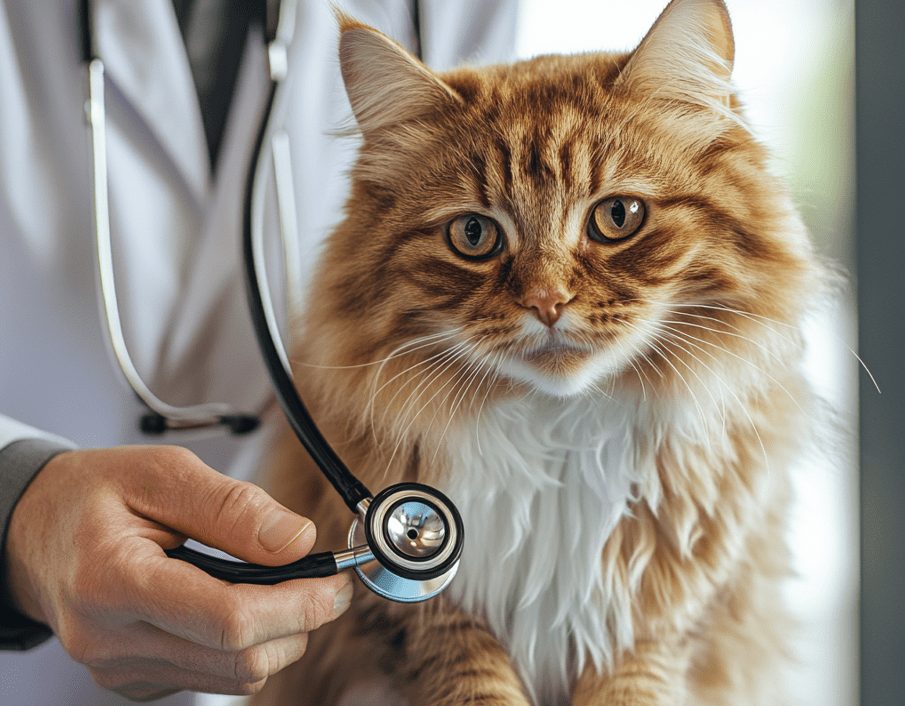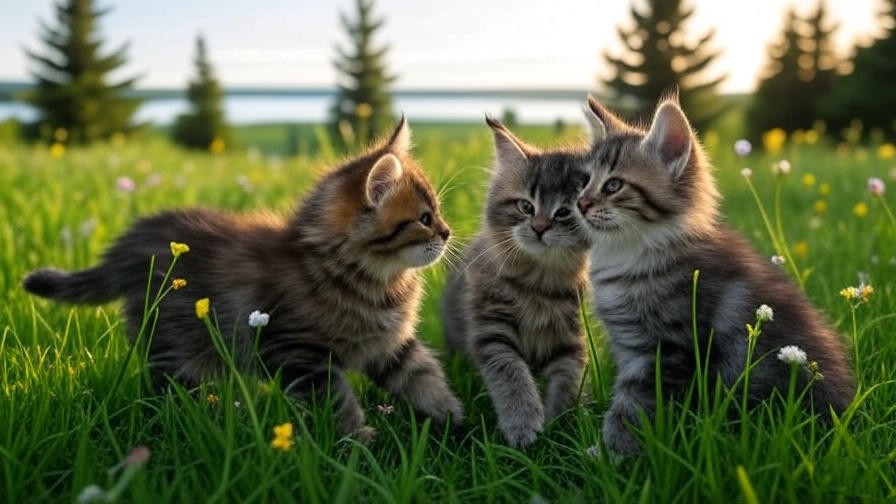
Imagine welcoming a fluffy, playful Maine Coon kitten into your Minnesota home, its tufted ears perked and bushy tail swishing as it bounds through your living room. These gentle giants, known for their dog-like loyalty and sociable nature, are a perfect fit for families and cat lovers alike. If you’re searching for Maine Coon kittens in MN, you’re likely eager to find a healthy, happy kitten from a reputable source. This comprehensive guide simplifies the process, offering expert-backed advice on choosing ethical breeders, ensuring kitten health, and preparing your home for your new feline friend. Drawing from insights by Minnesota veterinarians and trusted breeders, we’ll help you navigate every step with confidence.
Why Choose Maine Coon Kittens in MN?
Unique Traits of Maine Coon Cats
Maine Coons are often called the “gentle giants” of the cat world, and for good reason. These majestic felines can grow to 10–25 pounds, with males often larger than females. Their distinctive features—tufted ears, bushy tails, and long, shaggy coats—make them stand out. Beyond their striking appearance, Maine Coons are known for their friendly, sociable personalities. They often bond closely with their owners, following them around like loyal dogs and even enjoying playtime with children or other pets.
Their thick, water-repellent coats are well-suited to Minnesota’s chilly winters, making them an excellent choice for the state’s climate. According to Dr. Emily Larson, a Minneapolis-based veterinarian specializing in feline care, “Maine Coons adapt beautifully to colder environments, but their long coats require regular grooming to stay healthy and tangle-free.”
Popularity of Maine Coons in Minnesota
Maine Coons have surged in popularity across Minnesota, with local cat clubs reporting a 20% increase in breed registrations over the past five years, according to the Cat Fanciers’ Association (CFA). Their playful yet gentle demeanor makes them ideal for Minnesota’s family-oriented households, whether in bustling Minneapolis or quiet rural towns. Local cat shows, like the annual Twin Cities Cat Fanciers event, showcase the breed’s appeal, drawing enthusiasts eager to connect with reputable breeders.
Expert Insight: “Maine Coons are a favorite in Minnesota because they thrive in both active households and quieter settings,” says Dr. Larson. “Their adaptability and affectionate nature make them a joy to own.”
How to Find Reputable Maine Coon Breeders in Minnesota
Researching Ethical Breeders
Finding a trustworthy breeder is the first step to bringing home a healthy Maine Coon kitten in MN. Look for breeders registered with reputable organizations like The International Cat Association (TICA) or the CFA. These groups enforce strict ethical standards, ensuring kittens are raised in clean, loving environments. A good breeder will provide health guarantees, vaccination records, and proof of genetic testing for conditions like hypertrophic cardiomyopathy (HCM).
When researching, ask breeders about their socialization practices—kittens should be exposed to humans, other pets, and various stimuli early on. Visit their cattery if possible to see the living conditions firsthand. A reputable breeder will be transparent, welcoming questions about their practices.
Tip Box: Questions to Ask Breeders
- Are your kittens tested for genetic health conditions like HCM?
- What socialization techniques do you use?
- Can I see the parents’ health certifications?
- Do you provide a health guarantee or contract?
Red Flags to Avoid
Beware of breeders who prioritize profit over kitten welfare. Red flags include:
- Lack of health certifications or veterinary records.
- Kittens younger than 12 weeks being offered for sale.
- Poor living conditions, such as overcrowded or unclean catteries.
- Refusal to allow visits or meet in person.
If a deal seems too good to be true, it probably is. Avoid online scams advertising “cheap Maine Coon kittens” without verifiable credentials.
Local Resources for MN Residents
Minnesota is home to several TICA- and CFA-registered catteries. Check directories on TICA’s website or contact local cat clubs like the Minnesota Cat Fanciers for recommendations. Some well-regarded catteries in MN include:
- MN Coon Cattery (Minneapolis): Known for HCM-tested kittens and excellent socialization.
- Lakeside Maine Coons (Duluth): Specializes in champion bloodlines with health guarantees.
Expert Insight: “A good breeder invests in their kittens’ health and happiness,” says Sarah Thompson, owner of MN Coon Cattery. “Look for someone who treats their cats like family.”
Ensuring the Health of Maine Coon Kittens
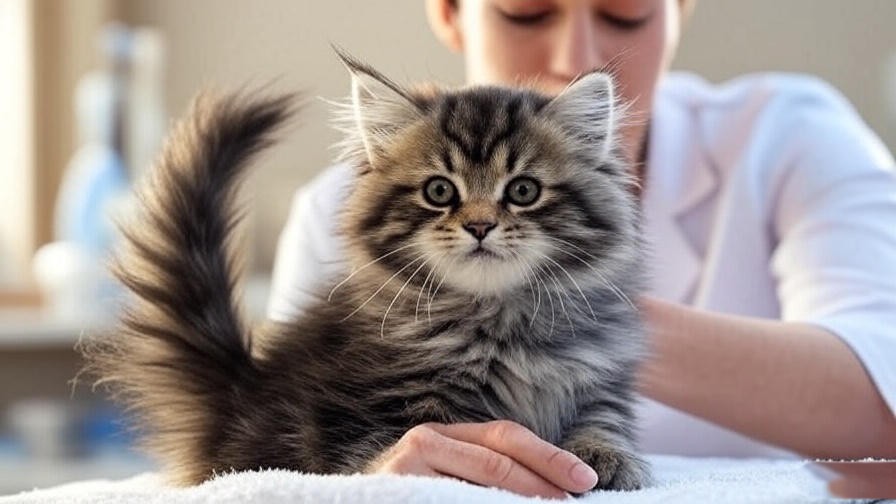
Common Health Concerns for Maine Coons
Maine Coons are generally robust, but they’re prone to certain genetic conditions. Hypertrophic cardiomyopathy (HCM), a heart condition, is the most common, affecting about 10% of the breed, according to veterinary studies. Hip dysplasia and spinal muscular atrophy (SMA) are also concerns, though less prevalent. Reputable breeders screen for these conditions, providing test results for both parents.
Before purchasing, ask for documentation of HCM screening via echocardiogram or genetic testing. Kittens should also be checked for parasites and receive their first vaccinations by 8–12 weeks.
Veterinary Checks for Kittens
Your kitten’s first vet visit is crucial. A Minnesota veterinarian will:
- Perform a physical exam to check for congenital issues.
- Administer core vaccines (FVRCP) and deworming treatments.
- Discuss spaying/neutering timelines, typically around 6 months.
Downloadable Checklist: First Vet Visit Essentials
- Vaccination records
- Fecal test results
- Discussion of diet and grooming needs
- Schedule for follow-up visits
Long-Term Health Maintenance
Maine Coons require regular grooming to prevent matting, especially in Minnesota’s humid summers or dry winters. Brush their coats 2–3 times weekly using a wide-tooth comb. Dental care is also critical—aim to brush their teeth weekly to prevent periodontal disease, which affects 70% of cats over age three, per the American Veterinary Medical Association.
Expert Insight: “Preventative care is key for Maine Coons,” says Dr. Larson. “Regular vet checkups and a consistent grooming routine can catch issues early and keep your kitten thriving.”
Preparing Your Minnesota Home for a Maine Coon Kitten
Kitten-Proofing Your Space
Maine Coon kittens are curious and adventurous, so kitten-proofing is essential. Secure electrical cords, remove toxic plants (like lilies), and store small objects out of reach. In Minnesota, winter brings additional challenges—ensure your home stays warm (above 65°F) to keep your kitten comfortable.
Checklist: Kitten-Proofing Tips
- Cover exposed wires with cord protectors.
- Lock away cleaning supplies and medications.
- Provide a cozy bed in a draft-free area.
Essential Supplies for Maine Coon Kittens
Maine Coons grow quickly, so invest in durable supplies:
- Litter Box: Choose a large, high-sided box (e.g., Petmate Giant Litter Pan).
- Scratching Post: Opt for a tall, sturdy post (e.g., SmartCat Ultimate Scratching Post).
- Food and Water Bowls: Use stainless steel or ceramic for durability.
| Product | Description | Where to Buy in MN |
|---|---|---|
| Petmate Giant Litter Pan | High-sided for large kittens | Petco (Minneapolis) |
| SmartCat Scratching Post | 32” tall, sisal-wrapped | Amazon, Chewy |
| Royal Canin Kitten Food | High-protein for growth | PetSmart (St. Paul) |
Socializing Your Maine Coon
Maine Coons thrive on interaction, so start socialization early. Introduce them to family members gradually, using treats to reinforce positive experiences. If you have other pets, supervise initial meetings in a neutral space. For Minnesota’s rural households, expose kittens to outdoor sounds (like farm equipment) through recordings to prevent skittishness.
Case Study: The Johnson family in Rochester adopted a Maine Coon kitten, Luna, from a TICA-registered breeder. By following a gradual socialization plan, Luna now plays confidently with their two dogs and greets visitors with purrs.
Feeding and Nutrition for Maine Coon Kittens
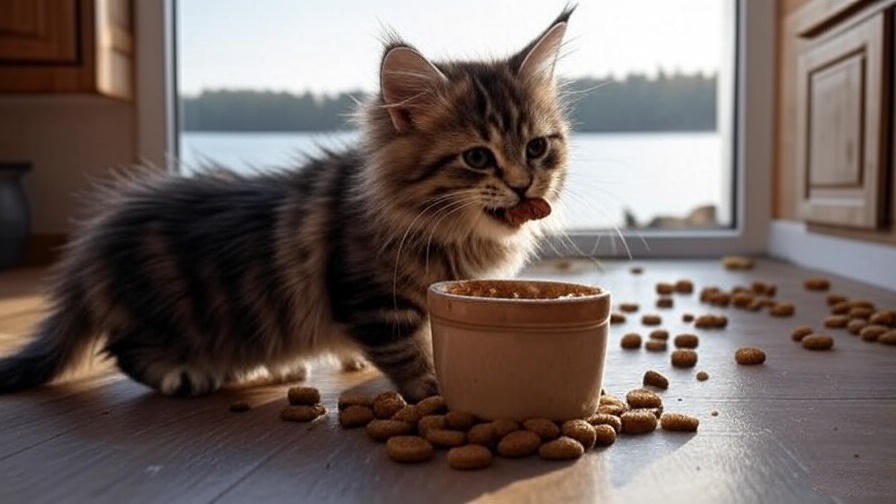
Nutritional Needs of Growing Maine Coons
Maine Coon kittens need a high-protein diet to support their rapid growth. Look for kitten foods with at least 30% protein and DHA for brain development. Brands like Royal Canin Kitten or Hill’s Science Diet Kitten are widely available in Minnesota pet stores.
Feeding Schedules and Portion Control
Feed 8–12-week-old kittens 3–4 small meals daily, following package guidelines for portions (typically ¼–½ cup per meal). Transition gradually to new foods over 7–10 days to avoid digestive upset.
Sample Feeding Schedule:
- 7 AM: ¼ cup wet food
- 12 PM: ¼ cup dry kibble
- 5 PM: ¼ cup wet food
- 9 PM: ¼ cup dry kibble
Expert Insight: “Maine Coons can become overweight if overfed,” says feline nutritionist Dr. Karen Becker. “Stick to measured portions and avoid free-feeding.”
Understanding Maine Coon Kitten Behavior and Training
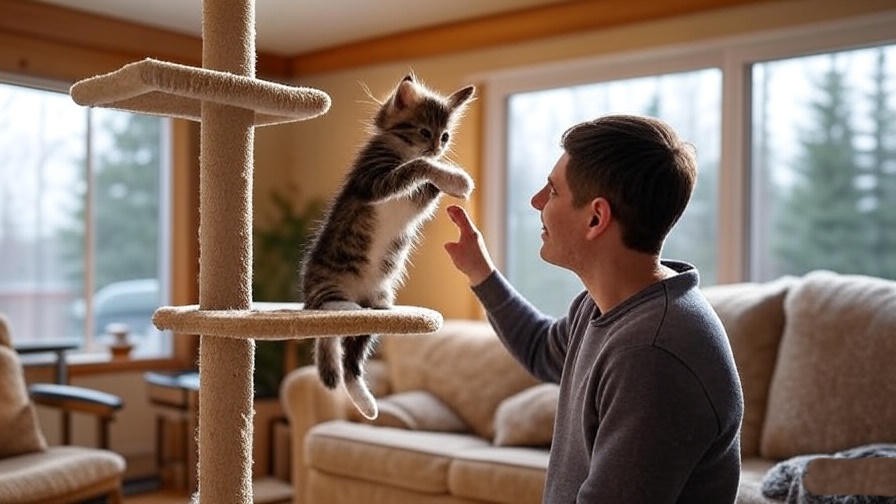
Typical Maine Coon Behaviors
Maine Coon kittens are known for their playful and vocal personalities. They often “talk” through chirps and trills, engaging owners in a way that feels almost conversational. Their love for play extends to fetching toys or chasing laser pointers, making them ideal for active households. Many Maine Coons are fascinated by water, happily splashing in sinks or drinking from fountains—a trait that sets them apart from other breeds.
Their climbing instincts are strong, so expect your kitten to explore high perches like bookshelves or cat trees. Providing outlets for these behaviors prevents destructive habits. For example, a sturdy cat tree can satisfy their need to climb while protecting your furniture.
Basic Training Tips
Training a Maine Coon kitten is straightforward due to their intelligence and eagerness to please. Start with these essentials:
- Litter Training: Most kittens from reputable breeders are litter-trained by 8 weeks. Reinforce this by placing the litter box in a quiet, accessible spot. If accidents occur, clean thoroughly with an enzymatic cleaner to remove odors.
- Scratching Post Use: Introduce a scratching post early, using catnip or toys to attract your kitten. Reward them with treats for using it.
- Basic Commands: Maine Coons can learn simple commands like “sit” or “come” with positive reinforcement. Use treats and praise to encourage compliance.
Step-by-Step Training Guide:
- Choose a quiet environment to minimize distractions.
- Use a high-value treat (e.g., freeze-dried chicken) to reward desired behaviors.
- Keep sessions short (5–10 minutes) to maintain your kitten’s attention.
- Be consistent with cues and rewards to build habits.
Socialization Challenges in MN
Socializing Maine Coon kittens in Minnesota varies by setting. In urban areas like Minneapolis, expose kittens to city noises (e.g., traffic, sirens) through gradual introductions or recordings. In rural areas, familiarize them with sounds like tractors or livestock to prevent fearfulness. Socialization should begin early—ideally between 2–12 weeks—to ensure a confident, well-adjusted cat.
Infographic Idea: Socialization Milestones
- 2–4 weeks: Gentle handling by breeder and exposure to humans.
- 4–8 weeks: Introduction to household noises and other pets.
- 8–12 weeks: Meeting new people and exploring safe outdoor spaces (e.g., enclosed patios).
Costs of Owning a Maine Coon Kitten in Minnesota
Initial Purchase and Adoption Fees
The cost of Maine Coon kittens in MN varies based on source. Reputable breeders typically charge $1,500–$3,000 for a pet-quality kitten, with show-quality or rare colorations (e.g., silver tabby) costing up to $5,000. Adoption from Minnesota shelters or rescues, like the Animal Humane Society in Golden Valley, is more affordable, with fees ranging from $100–$400, though purebred Maine Coons are rare in shelters.
Comparison Table: Breeder vs. Shelter Costs
| Source | Cost Range | Pros | Cons |
|---|---|---|---|
| Breeder | $1,500–$5,000 | Health guarantees, known lineage | Higher cost, longer wait times |
| Shelter | $100–$400 | Affordable, supports rescues | Limited breed availability |
Ongoing Expenses
Owning a Maine Coon in Minnesota involves recurring costs:
- Food: High-quality kitten food costs $20–$50/month, depending on brand and portion size.
- Grooming: Brushes, combs, and professional grooming (if needed) run $50–$100/year.
- Veterinary Care: Annual checkups, vaccinations, and preventative care average $150–$300/year.
- Supplies: Litter, toys, and bedding add $100–$200/year.
Estimated Annual Cost: $500–$1,000, excluding unexpected medical expenses.
Expert Insight: “Pet insurance can offset costs for Maine Coons, especially for genetic conditions like HCM,” says Jenna Carter, a Minnesota-based pet insurance advisor. “Shop around for plans that cover preventative care.”
Connecting with Minnesota’s Maine Coon Community
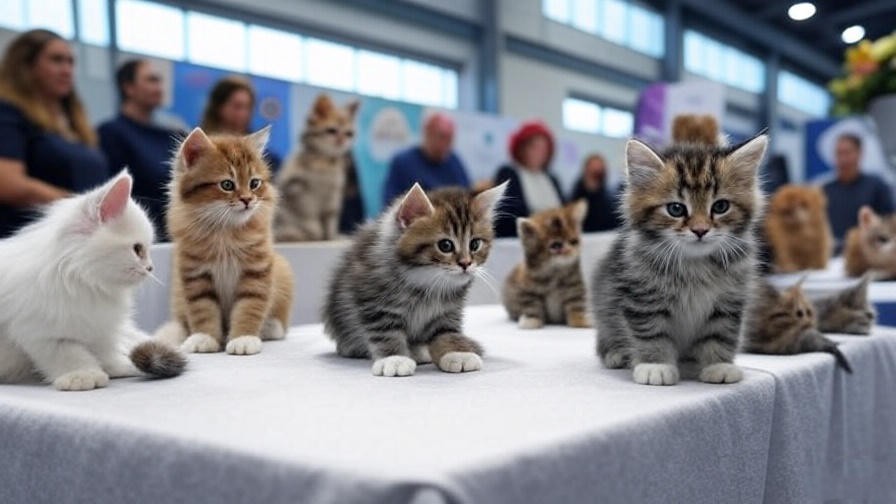
Local Cat Shows and Events
Minnesota hosts several cat shows where Maine Coon enthusiasts can connect with breeders and owners. The Twin Cities Cat Fanciers Show, held annually in St. Paul, features Maine Coons in competition and offers opportunities to meet TICA-registered breeders. Other events, like the Minnesota State Fair’s pet exhibitions, showcase the breed’s charm.
2025–2026 Event Calendar:
- Twin Cities Cat Fanciers Show: June 2025, St. Paul RiverCentre.
- Minnesota Cat Expo: September 2025, Minneapolis Convention Center.
- CFA Regional Show: April 2026, Bloomington.
Online Communities and Resources
Joining Minnesota’s Maine Coon community online can provide support and advice. Recommended platforms include:
- Facebook Groups: “Minnesota Maine Coon Lovers” (1,500+ members).
- X Accounts: Follow @MNCatFanciers for local updates and breeder recommendations.
- Forums: TICA’s regional discussion boards offer breeder reviews and care tips.
Tip: Engage respectfully in online communities by asking specific questions (e.g., “Which MN breeders specialize in polydactyl Maine Coons?”) to get the most helpful responses.
Expert Insight: “Cat shows are a great way to learn about Maine Coons and meet ethical breeders,” says Lisa Nguyen, organizer of the Twin Cities Cat Fanciers Show. “They’re also a fun family outing.”
Frequently Asked Questions (FAQs)
Where can I find Maine Coon kittens for sale in Minnesota?
Look for TICA- or CFA-registered breeders through their official directories or local cat clubs. Avoid online marketplaces without verifiable credentials to steer clear of scams. Reputable catteries like MN Coon Cattery or Lakeside Maine Coons are great starting points.
How do I know if a Maine Coon kitten is healthy?
A healthy kitten has clear eyes, a clean coat, and high energy levels. Ask for health certifications, including HCM screening, and ensure the kitten has received initial vaccinations and deworming. A vet check within 72 hours of adoption is recommended.
Are Maine Coons good for Minnesota’s cold climate?
Yes, their thick coats make them well-suited for cold weather. Provide indoor warmth during extreme winters and ensure regular grooming to prevent matting in humid conditions.
What’s the difference between adopting and buying a Maine Coon in MN?
Buying from a breeder ensures specific traits and health guarantees but is pricier ($1,500–$5,000). Adopting from a shelter ($100–$400) is more affordable but may not guarantee purebred status or detailed health history.
How much do Maine Coon kittens cost in Minnesota?
Expect $1,500–$3,000 for pet-quality kittens from breeders, with show-quality kittens costing more. Shelter adoptions range from $100–$400, depending on the organization.
Conclusion
Bringing a Maine Coon kitten into your Minnesota home is a rewarding journey, filled with purrs, playtime, and lifelong companionship. By choosing a reputable breeder, prioritizing health, and preparing your home, you’ll set the stage for a happy, healthy cat. Use the resources in this guide—local catteries, vet advice, and community events—to find your perfect kitten. Ready to start? Connect with Minnesota’s Maine Coon community, visit a trusted breeder, or share your questions in the comments below. Your new feline friend is waiting!

